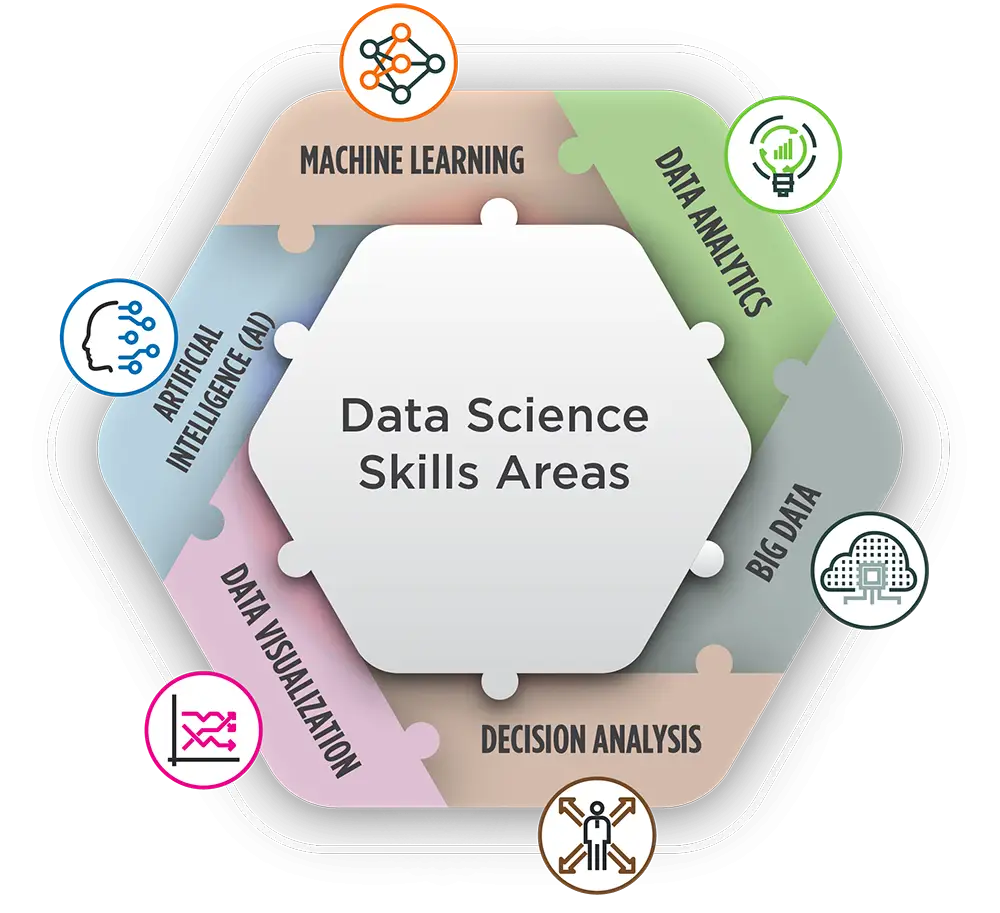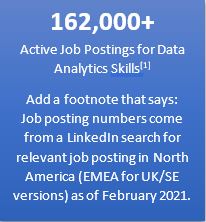This blog is taken as an excerpt from the Learning Tree eBook, Building Your Data Science Dream Team. Click here to access the full eBook >
"Data science" is an umbrella term which covers a large amount of conceptual ground and can encompass a wide array of related business and technical skills. Here we take a deeper look at the six major skill areas of data science to see how these skills contribute to the overall success of an organization.
Data Analytics
Data analytics is the most common use of data, involving extracting data from relational databases (e.g., SQL Server, Oracle) and presenting findings as reports and corporate dashboards. Data Analytics professionals should have the following skills:
- Manipulate databases using SQL
- Use dashboard tools and design effective dashboards
- Utilize statistical tools to maintain data integrity
- Produce effective, clear charts that inform, rather than confuse, decision makers
Related Job Titles
- Business Analyst
- Data Analyst
- Data Scientist
- Data Engineer
- Quantitative Analyst
- Project Manager
Machine Learning
Machine Learning (ML) involves training computers, through repeated presentation of observations and outcomes, to make predictions that are not obvious to a person. Machine learning experts on your team should have the following skills:
- Expertise in modeling techniques and tools
- Understanding of the statistical basis of algorithms
- Programming skills (Python or other machine learning language)
- Ability to work closely with data scientists to ensure machine learning technology delivers results for the organization
Related Job Titles
- Data Scientist
- Machine Learning Engineer
- AI Engineer
- Marching Learning Researcher
- Machine Learning Developer
- Data Engineer
Artificial Intelligence (AI)
Artificial Intelligence (AI) has been around since the 1950s, but today's AI researchers use cutting-edge technologies such as deep learning (previously known as neural networks), Natural Language Process, or NLP (used in conversational user interfaces), and image processing (as used in products such as self-driving cars). Important AI skills include:
- Programming and writing code for machines
- Designing and developing machines and systems that can learn and apply knowledge without specific direction.
- Research, analytical, organizational, and critical thinking skills
- AI professionals are typically highly specialized by area of research and niche expertise
Related Job Titles
- Machine Learning Engineer
- Data Scientist
- Business Intelligence Developer
- Research Scientist
- Big Data Engineer/Architect
- Software Engineer
Big Data
Big data describes working with data that is too large to be processed using standard (e.g., workstation, single server) tools. Popular platforms include Hadoop, Spark, and Tableau. Big data professionals must know how to:
- Operate and manage clusters of networked computers
- Maintain high availability of the cluster
- Understand how cyber security issues can affect big data
- Program using enterprise languages, such as Java and Scala
Related Job Titles
- Data Scientist
- Data Engineer
- Data Analyst
- Security Engineer
- Database Manager
- Data Architect
Data Visualization
Data visualization involves representing information visually (e.g., charts, tables, diagrams, illustrations) in order to bring data to life in a way that's easy to understand to drive better business decisions. Necessary data visualization skills include:
- Design visualization, create and implement complex visualizations from scratch
- Show clear, impactful data by bringing the big picture to life
- Understand stakeholder needs and communicate effectively with non-technical audiences
- Integrate statistical and verbal description of the data
Related Job Titles
- Data Analyst
- Database Architect
- Data Visualization Engineer
- Data Visualization Scientist
- Data Engineer
Decision Analysis
Decision analysis is the process of applying a standardized and tested methodology for decision-making which helps organization make decisions more easily and transparently. Necessary decision analysis skills include:
- Formalize the decision-making process
- Frame decisions, think creatively, analyze, and implement informed and justifiable decisions
- Understand uncertainty with data
- Use multi-criteria alternatives
- Leverage skills/tools like emotional intelligence, management techniques, decision trees, diagrams, and more
Related Job Titles
Decision analysis is a beneficial skill for anyone in an organization who is responsible for making decisions.
To learn more about how to apply these 6 skills categories in practice, explore the resources below:
- Download the Data Science Training Brochure >
- Discover bundled data science learning paths at: LearningTree.com/DSBundles
- Explore the full curriculum at: Learningtree.com/DataScience









